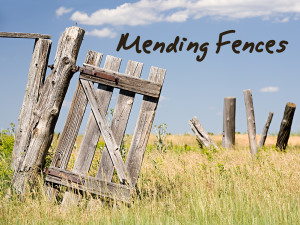Boundaries: Where you end and I begin
- Reisha Jack, LPC-MHSP

- Dec 1, 2019
- 3 min read
Updated: Nov 10, 2020
The concept of having healthy boundaries may be one that is new to you if you grew up in a household with little privacy and much responsibility. Boundaries are the invisible barrier between ourselves and others that defines our personal space physically, intellectually, emotionally, spiritually, and sexually.

Broken Fences
Unhealthy boundaries are often a byproduct of having little autonomy in your family of origin (the family with which you grew up). Those of us who had to share spaces, had little or no privacy, were not respected as a person but treated as a child that should be "seldom seen and unheard", whose negative emotions were stifled or ignored, and seemed to exist to fulfill the needs of others are very likely to have developed some unhealthy boundaries, if not non-existent. Let's be honest, how are we to magically learn to have appropriate boundaries as a adult, if we've never had the chance to practice or to see them modeled for us?

Trampled Barriers Signify Abused or Neglected Territory
Growing up, if there was an area or a yard with a damaged fence... you know, the one that the neighborhood boys would jump over so it leaned forward terribly... or the one with the missing boards that the kids (the other kids, not me) would just walk through... the property was not well respected or taken care of. It was abused and misused; shown little to no regard. People came and went as they pleased. Trash was often found, poor behavior and bad language often nearby. The same goes for us. When we have trampled boundaries that are damaged and offer little protection, we are likely to be misused and abused. Abuse typically falls into the categories of internal and / or external. A short list of common types of abuse are listed below.
Emotional Abuse - being belittled or told that "you shouldn't feel that way"; having your emotions dismissed or harshly criticized; having your emotions used against you in order to manipulate and control you, often with guilt and shame.
Intellectual Abuse - being restricted from asking questions of others, specifically those in authority; being told what to think because you are deemed unfit to think for yourself; being told that your opinions are invalid or wrong; put down and shamed
Spiritual Abuse - use of religion to manipulate and control you; restricting your access to or denying your right to learn religious concepts for yourself; being restricted from questioning religious leaders or from refusing their requests; mistreatment, abandonment, alienation
Physical/ Sexual Abuse- being harmed physically and/or sexually; being forced to participate in physical activity against your will; being restricted from resisting or refusing demands and requests of a physical or sexual nature; hitting, cutting, burning, etc
Mending Fences
So how do we repair our boundaries? Where do we begin? The first step, is beginning to believe that you deserve to have a safe space, both inside and outside of you, in which you are respected and FREE TO BE YOU! Coming to the realization that you have the power to determine what is allowed and what isn't allow to happen to and/or with you is essential to forming and maintaining healthy boundaries. Next, we need to assess for areas in our lives and relationships in which unhealthy boundaries exist (Which relationships? In what settings or situations?). Once we have identified those areas, we are ready to begin the work to repair what is damaged.
This is the part where you contact your friendly neighborhood therapist, Reisha Jack, LPC , to assist. Like Home Depot says, You can do it and I can help.
Click the couch below, or call (901)949-3602 to get scheduled today! Let's get to work!











Comments